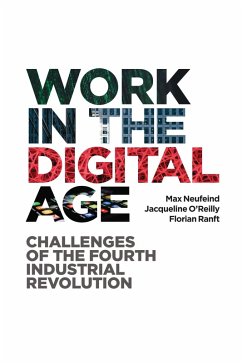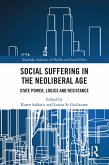Work in the Digital Age (eBook, PDF)
Challenges of the Fourth Industrial Revolution
Redaktion: Neufeind, Max; Ranft, Florian; O'Reilly, Jacqueline
31,95 €
31,95 €
inkl. MwSt.
Sofort per Download lieferbar

16 °P sammeln
31,95 €
Als Download kaufen

31,95 €
inkl. MwSt.
Sofort per Download lieferbar

16 °P sammeln
Jetzt verschenken
Alle Infos zum eBook verschenken
31,95 €
inkl. MwSt.
Sofort per Download lieferbar
Alle Infos zum eBook verschenken

16 °P sammeln
Work in the Digital Age (eBook, PDF)
Challenges of the Fourth Industrial Revolution
Redaktion: Neufeind, Max; Ranft, Florian; O'Reilly, Jacqueline
- Format: PDF
- Merkliste
- Auf die Merkliste
- Bewerten Bewerten
- Teilen
- Produkt teilen
- Produkterinnerung
- Produkterinnerung

Bitte loggen Sie sich zunächst in Ihr Kundenkonto ein oder registrieren Sie sich bei
bücher.de, um das eBook-Abo tolino select nutzen zu können.
Hier können Sie sich einloggen
Hier können Sie sich einloggen
Sie sind bereits eingeloggt. Klicken Sie auf 2. tolino select Abo, um fortzufahren.

Bitte loggen Sie sich zunächst in Ihr Kundenkonto ein oder registrieren Sie sich bei bücher.de, um das eBook-Abo tolino select nutzen zu können.
Shining a light on the very different experiences of work in the digital age, this book provides a unique contribution to the reform discussion on the consequences of the fourth industrial revolution. Drawing on a wide range of international expertise, contributors examine important policy challenges arising from the transformation of work as a result of the introduction of digital technology at work. Authors in this volume discuss the effects of automation, platform business models, stagnating productivity, increasing regional disparities, and rising levels of inequality within and between…mehr
- Geräte: PC
- mit Kopierschutz
- eBook Hilfe
- Größe: 2.45MB
Andere Kunden interessierten sich auch für
![Work in the Digital Age (eBook, ePUB) Work in the Digital Age (eBook, ePUB)]() Work in the Digital Age (eBook, ePUB)31,95 €
Work in the Digital Age (eBook, ePUB)31,95 €![Population and Labour Market Policies in China's Reform Process (eBook, PDF) Population and Labour Market Policies in China's Reform Process (eBook, PDF)]() Sun WenkaiPopulation and Labour Market Policies in China's Reform Process (eBook, PDF)41,95 €
Sun WenkaiPopulation and Labour Market Policies in China's Reform Process (eBook, PDF)41,95 €![The State of Social Welfare (eBook, PDF) The State of Social Welfare (eBook, PDF)]() The State of Social Welfare (eBook, PDF)58,95 €
The State of Social Welfare (eBook, PDF)58,95 €![Social Suffering in the Neoliberal Age (eBook, PDF) Social Suffering in the Neoliberal Age (eBook, PDF)]() Social Suffering in the Neoliberal Age (eBook, PDF)41,95 €
Social Suffering in the Neoliberal Age (eBook, PDF)41,95 €![Socio-Economic Insecurity in Emerging Economies (eBook, PDF) Socio-Economic Insecurity in Emerging Economies (eBook, PDF)]() Socio-Economic Insecurity in Emerging Economies (eBook, PDF)43,95 €
Socio-Economic Insecurity in Emerging Economies (eBook, PDF)43,95 €![Labour Market and Social Protection Reforms in International Perspective (eBook, PDF) Labour Market and Social Protection Reforms in International Perspective (eBook, PDF)]() Giuliano BonoliLabour Market and Social Protection Reforms in International Perspective (eBook, PDF)58,95 €
Giuliano BonoliLabour Market and Social Protection Reforms in International Perspective (eBook, PDF)58,95 €![Framing the Social Security Debate (eBook, PDF) Framing the Social Security Debate (eBook, PDF)]() Framing the Social Security Debate (eBook, PDF)19,95 €
Framing the Social Security Debate (eBook, PDF)19,95 €-
-
-
Shining a light on the very different experiences of work in the digital age, this book provides a unique contribution to the reform discussion on the consequences of the fourth industrial revolution. Drawing on a wide range of international expertise, contributors examine important policy challenges arising from the transformation of work as a result of the introduction of digital technology at work. Authors in this volume discuss the effects of automation, platform business models, stagnating productivity, increasing regional disparities, and rising levels of inequality within and between countries. They consider how to unlock the vast economic and social potential of new technologies and the implications for policy reform to meet these challenges. Mastering them requires developing a new inclusive narrative and progressive reform agenda. Such an agenda would be economic and political, and not determined universally by technology. The narrative is not only about what policymakers need to do, which is rather a lot. It is also about reforming established organisations and institutions, understanding new emerging players and supporting disaffected citizens in how the effects of these changes are going to affect their lives. The authors clearly pinpoint what needs to be done to support the transition to work in the digital era.
Produktdetails
- Produktdetails
- Verlag: Bloomsbury eBooks US
- Seitenzahl: 1
- Erscheinungstermin: 1. Juni 2018
- Englisch
- ISBN-13: 9798216364788
- Artikelnr.: 75141694
- Verlag: Bloomsbury eBooks US
- Seitenzahl: 1
- Erscheinungstermin: 1. Juni 2018
- Englisch
- ISBN-13: 9798216364788
- Artikelnr.: 75141694
- Herstellerkennzeichnung Die Herstellerinformationen sind derzeit nicht verfügbar.
Florian Ranft is Head of Policy and International at Policy Network. Jacqueline O'Reilly is Professor of Comparative Human Resources at the University of Sussex Business School. Max Neufeind is a researcher and policy adviser on the future of work.
Introduction: Identifying The Challenges For Work In The Digital Age
Jacqueline O'Reilly, Florian Ranft And Max Neufeind
Part I Debating The Fourth Industrial Revolution
A. The Destructive Creation Of Employment In The Digital Age
Destructive Creation: Explaining The Productivity Paradox In The Digital
Age (Luc Soete)
Entrepreneurial Finance In The Era Of Intelligent Tools And Digital
Platforms: Implications And Consequences For Work (Martin Kenney And John
Zysman)
Gender Equality Prospects And The Fourth Industrial Revolution (Debra
Howcroft And Jill Rubery)
No Need For Automation Angst, But Automation Policies (Daniel Arnold,
Melanie Arntz, Terry Gregory, Susanne Steffes And Ulrich Zierahn)
Value Creation In The Data-Driven Economy (Paul Hofheinz)
Shaping Structural Change In An Era Of New Technology (Robert D. Atkinson)
B. The Changing Face Of Work In The Digital Age
The Impact Of Artificial Intelligence On Employment (Georgios Petropoulos)
Game-Changing Technologies For European Manufacturing (Enrique
Fernández-Macías)
Mastering The Digital Transformation: An Inclusive Robotisation Agenda
(Monique Kremer And Robert Went)
Working In The Gig Economy: Insights From Europe (Ursula Huws, Neil H.
Spencer, Dag Sverre Syrdal And Kaire Holts)
The Platform Economy: Consequences For Labour, Inequality And The
Environment (Juliet Schor)
Employment And Regulation For Clickworkers (Janine Berg And Valerio De
Stefano)
C. Labour Relations And The Welfare State In The Digital Age
13. Redefining Labour Relations And Capital In The Digital Age (Colin
Crouch)
14. Rebalancing Worker Power In The Networked Economy: Toward Collective
Regulation Of Outsourced And Precarious Work (Virginia L. Doellgast)
15. Collective Action And Bargaining In The Digital Era (Cécile Jolly)
16. British Workers' Rights After Brexit (Kate Bell)
17. Why Adaptive Technical Skills Systems Are Needed To Capitalise On The
Technological Revolution: Challenges For The UK (Thomas Aubrey)
18. The Politics Of Social Risks And Social Protection In Digitalised
Economies (Bruno Palier)
19. The Work Of World In 2030: Four Scenarios (Salima Benhamou)
Part II: Comparing Digital Discourses
High Digital Density EU Countries
20. Denmark: Progressing The Voluntarist Approach (Anna Ilsøe)
21. Finland: Teaching Old Dogs New Tricks (Jenni Karjalainen)
22. Sweden: Will History Lead The Way In An Age Of Robots And Digital
Platforms? (Fredrik Söderqvist)
23. Netherlands: The Sectoral Impact Of Digitalisation On Employment And
Job Quality (Maarten Keune And Fabian Dekker)
B. Medium Digital Density EU Countries
24. Belgium: Reinvigorating The Self-Regulated Labour Market Model
(Patrizia Zanoni)
25. UK: Preparing For The Digital Revolution (Olivia Bailey And Andrew
Harrop)
26. Ireland: How To Escape The Low Learning Trap In A Runaway Labour Market
(Seán Ó Riain And Amy E. Healy)
27. Austria: Challenging The Perception Of Technology As An End In Itself
(Jörg Flecker)
28. Germany: Rebalancing The Coordinated Market Economy In Times Of
Disruptive Technologies (Sven Rahner And Michael Schönstein)
29. Spain: After The Storm - At The Crossroads Between Employment, Job
Quality And Technological Change (Rafael Grande)
30. Portugal: Preparing The Next Generation (Joana A. Vicente)
C. Low Digital Density EU Countries
31. France: Moving Up The Digital Ranks? (Enzo Weber)
32. Central And Eastern Europe: Raising Living Standards Through
Innovation-Driven Growth (Jan Drahokoupil)
33. Slovenia: The Grassroots, Trade Unions And Empowering The Young
(Aleksandra Kanjuo Mrcela)
34. Latvia: A Case Of Paradigmatic Misalignment (Dmitrijs Kravcenko)
35. Poland: Developing A Smart Digital Agenda (Maria Skóra)
36. Italy: Prioritising Human Capital (Carlotta De Franceschi)
37. Greece: In Search Of Growth, Work And Welfare After The Crisis (Sotiria
Theodoropoulou)
D. Global Perspectives
38. Canada: Opportunities For The Many? (Juan Gomez And Rafael Gomez)
39. US: Balancing Risks And Improving Job Quality In A Changing Economy
(Arne L. Kalleberg)
40. India: Livelihoods In A Digital Age Of Manufacturing (Marc Saxer)
Conclusion: Political Realities And A Reform Agenda For The Digital Age
Max Neufeind, Florian Ranft And Jacqueline O'Reilly
Jacqueline O'Reilly, Florian Ranft And Max Neufeind
Part I Debating The Fourth Industrial Revolution
A. The Destructive Creation Of Employment In The Digital Age
Destructive Creation: Explaining The Productivity Paradox In The Digital
Age (Luc Soete)
Entrepreneurial Finance In The Era Of Intelligent Tools And Digital
Platforms: Implications And Consequences For Work (Martin Kenney And John
Zysman)
Gender Equality Prospects And The Fourth Industrial Revolution (Debra
Howcroft And Jill Rubery)
No Need For Automation Angst, But Automation Policies (Daniel Arnold,
Melanie Arntz, Terry Gregory, Susanne Steffes And Ulrich Zierahn)
Value Creation In The Data-Driven Economy (Paul Hofheinz)
Shaping Structural Change In An Era Of New Technology (Robert D. Atkinson)
B. The Changing Face Of Work In The Digital Age
The Impact Of Artificial Intelligence On Employment (Georgios Petropoulos)
Game-Changing Technologies For European Manufacturing (Enrique
Fernández-Macías)
Mastering The Digital Transformation: An Inclusive Robotisation Agenda
(Monique Kremer And Robert Went)
Working In The Gig Economy: Insights From Europe (Ursula Huws, Neil H.
Spencer, Dag Sverre Syrdal And Kaire Holts)
The Platform Economy: Consequences For Labour, Inequality And The
Environment (Juliet Schor)
Employment And Regulation For Clickworkers (Janine Berg And Valerio De
Stefano)
C. Labour Relations And The Welfare State In The Digital Age
13. Redefining Labour Relations And Capital In The Digital Age (Colin
Crouch)
14. Rebalancing Worker Power In The Networked Economy: Toward Collective
Regulation Of Outsourced And Precarious Work (Virginia L. Doellgast)
15. Collective Action And Bargaining In The Digital Era (Cécile Jolly)
16. British Workers' Rights After Brexit (Kate Bell)
17. Why Adaptive Technical Skills Systems Are Needed To Capitalise On The
Technological Revolution: Challenges For The UK (Thomas Aubrey)
18. The Politics Of Social Risks And Social Protection In Digitalised
Economies (Bruno Palier)
19. The Work Of World In 2030: Four Scenarios (Salima Benhamou)
Part II: Comparing Digital Discourses
High Digital Density EU Countries
20. Denmark: Progressing The Voluntarist Approach (Anna Ilsøe)
21. Finland: Teaching Old Dogs New Tricks (Jenni Karjalainen)
22. Sweden: Will History Lead The Way In An Age Of Robots And Digital
Platforms? (Fredrik Söderqvist)
23. Netherlands: The Sectoral Impact Of Digitalisation On Employment And
Job Quality (Maarten Keune And Fabian Dekker)
B. Medium Digital Density EU Countries
24. Belgium: Reinvigorating The Self-Regulated Labour Market Model
(Patrizia Zanoni)
25. UK: Preparing For The Digital Revolution (Olivia Bailey And Andrew
Harrop)
26. Ireland: How To Escape The Low Learning Trap In A Runaway Labour Market
(Seán Ó Riain And Amy E. Healy)
27. Austria: Challenging The Perception Of Technology As An End In Itself
(Jörg Flecker)
28. Germany: Rebalancing The Coordinated Market Economy In Times Of
Disruptive Technologies (Sven Rahner And Michael Schönstein)
29. Spain: After The Storm - At The Crossroads Between Employment, Job
Quality And Technological Change (Rafael Grande)
30. Portugal: Preparing The Next Generation (Joana A. Vicente)
C. Low Digital Density EU Countries
31. France: Moving Up The Digital Ranks? (Enzo Weber)
32. Central And Eastern Europe: Raising Living Standards Through
Innovation-Driven Growth (Jan Drahokoupil)
33. Slovenia: The Grassroots, Trade Unions And Empowering The Young
(Aleksandra Kanjuo Mrcela)
34. Latvia: A Case Of Paradigmatic Misalignment (Dmitrijs Kravcenko)
35. Poland: Developing A Smart Digital Agenda (Maria Skóra)
36. Italy: Prioritising Human Capital (Carlotta De Franceschi)
37. Greece: In Search Of Growth, Work And Welfare After The Crisis (Sotiria
Theodoropoulou)
D. Global Perspectives
38. Canada: Opportunities For The Many? (Juan Gomez And Rafael Gomez)
39. US: Balancing Risks And Improving Job Quality In A Changing Economy
(Arne L. Kalleberg)
40. India: Livelihoods In A Digital Age Of Manufacturing (Marc Saxer)
Conclusion: Political Realities And A Reform Agenda For The Digital Age
Max Neufeind, Florian Ranft And Jacqueline O'Reilly
Introduction: Identifying The Challenges For Work In The Digital Age
Jacqueline O'Reilly, Florian Ranft And Max Neufeind
Part I Debating The Fourth Industrial Revolution
A. The Destructive Creation Of Employment In The Digital Age
Destructive Creation: Explaining The Productivity Paradox In The Digital
Age (Luc Soete)
Entrepreneurial Finance In The Era Of Intelligent Tools And Digital
Platforms: Implications And Consequences For Work (Martin Kenney And John
Zysman)
Gender Equality Prospects And The Fourth Industrial Revolution (Debra
Howcroft And Jill Rubery)
No Need For Automation Angst, But Automation Policies (Daniel Arnold,
Melanie Arntz, Terry Gregory, Susanne Steffes And Ulrich Zierahn)
Value Creation In The Data-Driven Economy (Paul Hofheinz)
Shaping Structural Change In An Era Of New Technology (Robert D. Atkinson)
B. The Changing Face Of Work In The Digital Age
The Impact Of Artificial Intelligence On Employment (Georgios Petropoulos)
Game-Changing Technologies For European Manufacturing (Enrique
Fernández-Macías)
Mastering The Digital Transformation: An Inclusive Robotisation Agenda
(Monique Kremer And Robert Went)
Working In The Gig Economy: Insights From Europe (Ursula Huws, Neil H.
Spencer, Dag Sverre Syrdal And Kaire Holts)
The Platform Economy: Consequences For Labour, Inequality And The
Environment (Juliet Schor)
Employment And Regulation For Clickworkers (Janine Berg And Valerio De
Stefano)
C. Labour Relations And The Welfare State In The Digital Age
13. Redefining Labour Relations And Capital In The Digital Age (Colin
Crouch)
14. Rebalancing Worker Power In The Networked Economy: Toward Collective
Regulation Of Outsourced And Precarious Work (Virginia L. Doellgast)
15. Collective Action And Bargaining In The Digital Era (Cécile Jolly)
16. British Workers' Rights After Brexit (Kate Bell)
17. Why Adaptive Technical Skills Systems Are Needed To Capitalise On The
Technological Revolution: Challenges For The UK (Thomas Aubrey)
18. The Politics Of Social Risks And Social Protection In Digitalised
Economies (Bruno Palier)
19. The Work Of World In 2030: Four Scenarios (Salima Benhamou)
Part II: Comparing Digital Discourses
High Digital Density EU Countries
20. Denmark: Progressing The Voluntarist Approach (Anna Ilsøe)
21. Finland: Teaching Old Dogs New Tricks (Jenni Karjalainen)
22. Sweden: Will History Lead The Way In An Age Of Robots And Digital
Platforms? (Fredrik Söderqvist)
23. Netherlands: The Sectoral Impact Of Digitalisation On Employment And
Job Quality (Maarten Keune And Fabian Dekker)
B. Medium Digital Density EU Countries
24. Belgium: Reinvigorating The Self-Regulated Labour Market Model
(Patrizia Zanoni)
25. UK: Preparing For The Digital Revolution (Olivia Bailey And Andrew
Harrop)
26. Ireland: How To Escape The Low Learning Trap In A Runaway Labour Market
(Seán Ó Riain And Amy E. Healy)
27. Austria: Challenging The Perception Of Technology As An End In Itself
(Jörg Flecker)
28. Germany: Rebalancing The Coordinated Market Economy In Times Of
Disruptive Technologies (Sven Rahner And Michael Schönstein)
29. Spain: After The Storm - At The Crossroads Between Employment, Job
Quality And Technological Change (Rafael Grande)
30. Portugal: Preparing The Next Generation (Joana A. Vicente)
C. Low Digital Density EU Countries
31. France: Moving Up The Digital Ranks? (Enzo Weber)
32. Central And Eastern Europe: Raising Living Standards Through
Innovation-Driven Growth (Jan Drahokoupil)
33. Slovenia: The Grassroots, Trade Unions And Empowering The Young
(Aleksandra Kanjuo Mrcela)
34. Latvia: A Case Of Paradigmatic Misalignment (Dmitrijs Kravcenko)
35. Poland: Developing A Smart Digital Agenda (Maria Skóra)
36. Italy: Prioritising Human Capital (Carlotta De Franceschi)
37. Greece: In Search Of Growth, Work And Welfare After The Crisis (Sotiria
Theodoropoulou)
D. Global Perspectives
38. Canada: Opportunities For The Many? (Juan Gomez And Rafael Gomez)
39. US: Balancing Risks And Improving Job Quality In A Changing Economy
(Arne L. Kalleberg)
40. India: Livelihoods In A Digital Age Of Manufacturing (Marc Saxer)
Conclusion: Political Realities And A Reform Agenda For The Digital Age
Max Neufeind, Florian Ranft And Jacqueline O'Reilly
Jacqueline O'Reilly, Florian Ranft And Max Neufeind
Part I Debating The Fourth Industrial Revolution
A. The Destructive Creation Of Employment In The Digital Age
Destructive Creation: Explaining The Productivity Paradox In The Digital
Age (Luc Soete)
Entrepreneurial Finance In The Era Of Intelligent Tools And Digital
Platforms: Implications And Consequences For Work (Martin Kenney And John
Zysman)
Gender Equality Prospects And The Fourth Industrial Revolution (Debra
Howcroft And Jill Rubery)
No Need For Automation Angst, But Automation Policies (Daniel Arnold,
Melanie Arntz, Terry Gregory, Susanne Steffes And Ulrich Zierahn)
Value Creation In The Data-Driven Economy (Paul Hofheinz)
Shaping Structural Change In An Era Of New Technology (Robert D. Atkinson)
B. The Changing Face Of Work In The Digital Age
The Impact Of Artificial Intelligence On Employment (Georgios Petropoulos)
Game-Changing Technologies For European Manufacturing (Enrique
Fernández-Macías)
Mastering The Digital Transformation: An Inclusive Robotisation Agenda
(Monique Kremer And Robert Went)
Working In The Gig Economy: Insights From Europe (Ursula Huws, Neil H.
Spencer, Dag Sverre Syrdal And Kaire Holts)
The Platform Economy: Consequences For Labour, Inequality And The
Environment (Juliet Schor)
Employment And Regulation For Clickworkers (Janine Berg And Valerio De
Stefano)
C. Labour Relations And The Welfare State In The Digital Age
13. Redefining Labour Relations And Capital In The Digital Age (Colin
Crouch)
14. Rebalancing Worker Power In The Networked Economy: Toward Collective
Regulation Of Outsourced And Precarious Work (Virginia L. Doellgast)
15. Collective Action And Bargaining In The Digital Era (Cécile Jolly)
16. British Workers' Rights After Brexit (Kate Bell)
17. Why Adaptive Technical Skills Systems Are Needed To Capitalise On The
Technological Revolution: Challenges For The UK (Thomas Aubrey)
18. The Politics Of Social Risks And Social Protection In Digitalised
Economies (Bruno Palier)
19. The Work Of World In 2030: Four Scenarios (Salima Benhamou)
Part II: Comparing Digital Discourses
High Digital Density EU Countries
20. Denmark: Progressing The Voluntarist Approach (Anna Ilsøe)
21. Finland: Teaching Old Dogs New Tricks (Jenni Karjalainen)
22. Sweden: Will History Lead The Way In An Age Of Robots And Digital
Platforms? (Fredrik Söderqvist)
23. Netherlands: The Sectoral Impact Of Digitalisation On Employment And
Job Quality (Maarten Keune And Fabian Dekker)
B. Medium Digital Density EU Countries
24. Belgium: Reinvigorating The Self-Regulated Labour Market Model
(Patrizia Zanoni)
25. UK: Preparing For The Digital Revolution (Olivia Bailey And Andrew
Harrop)
26. Ireland: How To Escape The Low Learning Trap In A Runaway Labour Market
(Seán Ó Riain And Amy E. Healy)
27. Austria: Challenging The Perception Of Technology As An End In Itself
(Jörg Flecker)
28. Germany: Rebalancing The Coordinated Market Economy In Times Of
Disruptive Technologies (Sven Rahner And Michael Schönstein)
29. Spain: After The Storm - At The Crossroads Between Employment, Job
Quality And Technological Change (Rafael Grande)
30. Portugal: Preparing The Next Generation (Joana A. Vicente)
C. Low Digital Density EU Countries
31. France: Moving Up The Digital Ranks? (Enzo Weber)
32. Central And Eastern Europe: Raising Living Standards Through
Innovation-Driven Growth (Jan Drahokoupil)
33. Slovenia: The Grassroots, Trade Unions And Empowering The Young
(Aleksandra Kanjuo Mrcela)
34. Latvia: A Case Of Paradigmatic Misalignment (Dmitrijs Kravcenko)
35. Poland: Developing A Smart Digital Agenda (Maria Skóra)
36. Italy: Prioritising Human Capital (Carlotta De Franceschi)
37. Greece: In Search Of Growth, Work And Welfare After The Crisis (Sotiria
Theodoropoulou)
D. Global Perspectives
38. Canada: Opportunities For The Many? (Juan Gomez And Rafael Gomez)
39. US: Balancing Risks And Improving Job Quality In A Changing Economy
(Arne L. Kalleberg)
40. India: Livelihoods In A Digital Age Of Manufacturing (Marc Saxer)
Conclusion: Political Realities And A Reform Agenda For The Digital Age
Max Neufeind, Florian Ranft And Jacqueline O'Reilly







